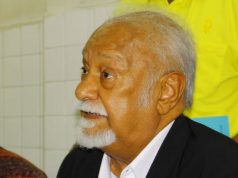Kuala Lumpur, Jan 11 – The High Court here today set Feb 21 to decide on a sedition charge against lawyer Karpal Singh.
Karpal Singh was charged with uttering seditious words against the Sultan of Perak at his law firm in Jalan Pudu Lama here on Feb 6, 2009.
Justice Datuk Azman Abdullah set the date after hearing submissions by lawyer Gobind Singh Deo, representing Karpal Singh, and Deputy Public Prosecutor Noorin Badaruddin at the end of the defence case.
Karpal, 74, was alleged to have said that the removal of Datuk Seri Mohammad Nizar Jamaluddin as Perak Menteri Besar and Datuk Seri Dr Zambry Abdul Kadir’s appointment to the post by the sultan could be questioned in a court of law.
He is charged under Section 4 (1) (b) of the Sedition Act 1948 which carries a maximum imprisonment for three years and fine of RM5,000 or both, if found guilty.
On June 11, 2010, Karpal Singh was discharged and acquitted by the High Court at the end of the prosecution’s case, but upon appeal by the prosecution, he was ordered to enter his defence.
Gobind Singh, in his submission, said the press conference on Feb 6, 2009 at Karpal Singh’s law firm was made in good faith and backed with case laws.
Karpal Singh’s views on the removal of Mohammad Nizar as Perak Menteri Besar was just a legal opinion, and whatever words uttered at the press conference were not an offence under the Sedition Act 1948, he added.
He said Karpal Singh was not questioning the discretionary power or prerogative of the Sultan of Perak, but the manner with which the sultan went about in solving the crisis.
“Karpal, in his media statement, had pointed out that the sultan has the power to act under Article 16(6) of the state constitution in the event the menteri besar ceases to command the confidence of the majority of the legislative assembly.
“However, prior to such decision, the accused (Karpal Singh) contended that what needed first to be decided at that time was the validity of the resignation of the three assemblymen, which was a question expressly reserved to the assembly and not the sultan himself under Article 33(1) of the Perak state constitution,” he added.
Gobind Singh said the primary intention of the accused was to show that the sultan was mistaken when he acted in the manner he did, and Karpal Singh did not commit any offence within the meaning of Section 3(1)(f) of the Sedition Act.
“The statement of the accused in P3 (media statement) that he would sue the Sultan of Perak and the new government of Perak cannot, by any stretch of the imagination, be said to be an offence under the Act.
“The law allows for Rulers to be sued and it is for that reason that the Special Court was established in 1993,” he added.
Meanwhile, Noorin submitted that Karpal Singh had committed an offence by uttering words which were seditious in nature as provided under Section 3 of the Sedition Act.
She said that at the end of the defence’s case, the accused failed to raise reasonable doubts against the prosecution’s case and that there was no strong and cogent evidence that could be given by karpal Singh to prove that the prosecution had been selective in their decision to prosecute him or had acted against the constitution or any law.
We submit that Karpal (Singh) was not giving his legal opinion, but had instead showed his anger, following the appointment of a new menteri besar who was not from a component party of Pakatan Rakyat, by the sultan, she added.
– Bernama










